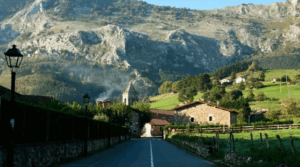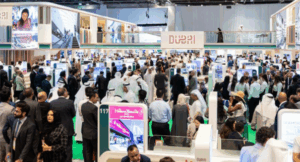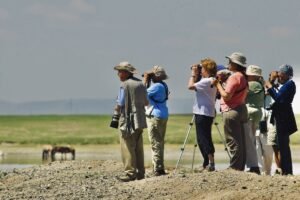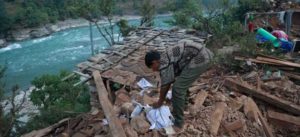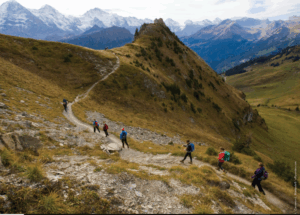Joint communique of leaders’ roundtable of 2nd Belt and Road Forum for International Cooperation
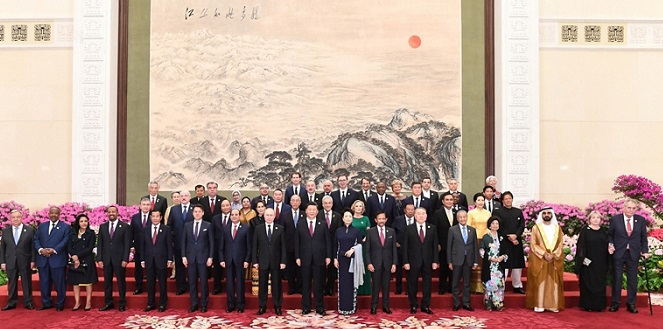
Beijing (Xinhua) – A total of 283 items of practical outcomes were achieved during the preparatory process and the holding of the Second Belt and Road Forum for International Cooperation in Beijing, Chinese President Xi Jinping said today when meeting the press.
Cooperation agreements worth more than 64 billion U.S. dollars were signed at a CEO conference during the Second Belt and Road Forum for International Cooperation (BRF) held in Beijing.
Participants to the Second Belt and Road Forum for International Cooperation (BRF) agreed the BRF is an important platform for multilateral cooperation, and should be held on a regular basis, President Xi Jinping announced at the closing of the forum in Beijing on Saturday.
Joint Communique of the Leaders’ Roundtable of the 2nd Belt and Road Forum for International Cooperation
1.We, President Xi Jinping of the People’s Republic of China, President Ilham Aliyev of the Republic of Azerbaijan, President Alexander Lukashenko of the Republic of Belarus, His Majesty Sultan Haji Hassanal Bolkiah Mu’izzaddin Waddaulah of Brunei Darussalam, President Sebastián Piñera Echenique of the Republic of Chile, President Nicos Anastasiades of the Republic of Cyprus, President Miloš Zeman of the Czech Republic, President Ismail Omar Guelleh of the Republic of Djibouti, President Abdul Fatah Al-Sisi of the Arab Republic of Egypt, the First President of the Republic of Kazakhstan – Elbasy Nursultan Nazarbayev, President Uhuru Kenyatta of the Republic of Kenya, President Sooronbai Zheenbekov of the Kyrgyz Republic, President Bounnhang Vorachith of the Lao People’s Democratic Republic, President Khaltmaagiin Battulga of Mongolia, President Filipe Jacinto Nyusi of the Republic of Mozambique, President Bidya Devi Bhandari of Nepal, President Rodrigo Roa Duterte of the Republic of the Philippines, President Marcelo Rebelo de Sousa of the Portuguese Republic, President Vladimir Putin of the Russian Federation, President Aleksandar Vučić of the Republic of Serbia, President Ueli Maurer of the Swiss Confederation, President Emomali Rahmon of the Republic of Tajikistan, President Shavkat Mirziyoyev of the Republic of Uzbekistan, Vice President and Prime Minister H.H. Sheikh Mohammed bin Rashid Al Maktoum of the United Arab Emirates and Ruler of Dubai, Chancellor Sebastian Kurz of the Republic of Austria, Prime Minister Hun Sen of the Kingdom of Cambodia, Prime Minister Abiy Ahmed Ali of the Federal Democratic Republic of Ethiopia, Prime Minister Alexis Tsipras of the Hellenic Republic, Prime Minister Orbán Viktor of Hungary, Prime Minister Giuseppe Conte of the Italian Republic, Prime Minister Mahathir Bin Mohamad of Malaysia, State Counsellor Aung San Suu Kyi of the Republic of the Union of Myanmar, Prime Minister Imran Khan of the Islamic Republic of Pakistan, Prime Minister Peter O’Neill of the Independent State of Papua New Guinea, Prime Minister Lee Hsien Loong of the Republic of Singapore, Prime Minister Prayut Chan-o-cha of the Kingdom of Thailand, Prime Minister Nguyen Xuan Phuc of the Socialist Republic of Viet Nam, and Vice President Jusuf Kalla of the Republic of Indonesia, met in Beijing on 27 April 2019 for the Leaders’ Roundtable of the 2nd Belt and Road Forum for International Cooperation themed on Belt and Road Cooperation: Shaping a Brighter Shared Future. We also welcome the participation of Secretary-General António Guterres of the United Nations and Managing Director Christine Lagarde of the International Monetary Fund. The Leaders’ Roundtable was chaired by President Xi Jinping of the People’s Republic of China.
2.We met at a time when the world economy is facing both expanding opportunities and rising challenges, complicated by profound and rapid changes in the world. We reaffirm that strengthening multilateralism remains essential in addressing global challenges. We also believe that an open, inclusive, interconnected, sustainable and people-centered world economy can contribute to prosperity for all.
3.Recalling the Joint Communique of the Leaders’ Roundtable of the 1st Belt and Road Forum for International Cooperation, including the cooperation objectives, principles and measures contained therein, and reaffirming our commitment to the UN 2030 Agenda for Sustainable Development, we reiterate that promoting peace, development and human rights, mutually-beneficial cooperation, and honoring the purposes and principles of the UN Charter and international law are our common responsibilities; achieving strong, sustainable, balanced and inclusive growth and improving people’s quality of life are our common goals; creating a prosperous and peaceful world with shared future is our common aspiration.
4.The ancient Silk Road contributed to the strengthening of the connectivity and the expansion of the world economy in the spirit of promoting peace and cooperation, openness, inclusiveness, equality, mutual learning and mutual benefit. We look forward to restoring and rejuvenating such spirit, through the Belt and Road Initiative and other cooperation frameworks and initiatives.
5.As cooperation partners, we appreciate the progress already made and important opportunities created in the Belt and Road cooperation, especially the outcomes in areas such as development policy synergy, increased infrastructure investment, economic corridors, economic and trade cooperation zones, industrial parks, finance and trade cooperation, innovation and technology, maritime cooperation, business-to-business ties, people-to-people and cultural exchange. Such cooperation explores new sources of growth and offers potential for economic and social development, and contributes to the achievement of the Sustainable Development Goals.
6.Looking into the future, we envisage high-quality Belt and Road cooperation in enhancing connectivity by promoting development policy synergy, infrastructure development, unimpeded trade, financial cooperation and people-to-people bond, thereby enhancing practical cooperation for the well-being of our peoples. In this context, we look forward to more efforts by cooperation partners.
——Such cooperation will be based on extensive consultation, joint efforts, shared and mutual benefits. We emphasize the importance of the rule of law and equal opportunities for all. We endeavor to move on with policy and project cooperation through voluntary participation and consensus-building, based on common responsibility and outcomes. All states are equal partners for cooperation that respects openness, transparency, inclusiveness and level playing field. We respect sovereignty and territorial integrity of each other and affirm that each country has the right and primary responsibility to define its development strategies in accordance with its national priorities and legislation.
——Such cooperation will be open, green and clean. We embrace open economy and inclusive, non-discriminatory global market. All interested countries are welcome to join in such cooperation. We underline the importance of promoting green development and addressing the challenges of environmental protection and climate change including by enhancing our cooperation to implement the Paris Agreement. We encourage more efforts in building a culture of integrity and combating corruption.
——Such cooperation will pursue high standard, people-centered and sustainable development. We will work together in line with our national legislation, regulatory frameworks, international obligations, applicable international norms and standards. We believe that relevant cooperation should be people-centered and conducive to inclusive quality economic growth and broad-based improvement of people’s livelihood. We are committed to promoting sustainability in all its dimensions.
7.We start from the conviction that connectivity contributes to boosting growth, economic and social development, trade in goods and services, as well as investment and creating employment opportunities and better communication and exchanges among peoples. In this regard, promoting global partnership on connectivity, based on transparency, openness and inclusiveness, provides an opportunity for all. Today, through such partnership including the Belt and Road Initiative and other cooperation strategies, we resolve to promote international cooperation, at sub-regional, regional and global levels aiming at a brighter shared future and common prosperity. We support a universal, rules-based, open, transparent and non-discriminatory multilateral trading system with WTO at its core.
Strengthening Development Policy Synergy
8. To sustain common development, we welcome sound macroeconomic policies, encourage discussions with regard to Sustainable Development Agenda and will work together to enhance macroeconomic policy dialogue at the UN and other multilateral fora, and promote synergies among related development plans and connectivity initiatives based on the progress already made.
9. In this regard, we also emphasize the opportunities arising from the initiatives and cooperation frameworks, including, inter alia, the ACMECS Master Plan (2019-2023), the African Union including Programme for Infrastructure Development in Africa (PIDA), APEC Connectivity Blueprint, the Arab League, Association of Southeast Asian Nations (ASEAN) including Master Plan on ASEAN Connectivity 2025, ASEAN Smart Cities Network and ASEAN Initiative on Connecting the Connectivities, ASEM Pathfinder Group on Connectivity, BIMP-East ASEAN Growth Area, Central Asian Connectivity, Community of Latin American and Caribbean States (CELAC), the Dubai Silk Road Strategy, EU strategy on connecting Europe and Asia, EU-China Connectivity Platform, EU Eastern Partnership, Eurasian Economic Union, Eurasian partnership, Forum on China-Africa Cooperation (FOCAC), Greater Mekong Subregion (GMS), Global Infrastructure Connectivity Alliance, International G-Global Project, Lancang-Mekong Cooperation, Organization of American States, Pacific Alliance, Pacific Islands Forum, Union for the Mediterranean and those sub-regional and regional cooperation initiatives between all partners.
10. Determined to pursue trade and investment liberalization and facilitation, we aspire to further open our markets, reject protectionism, unilateralism and other measures that are incompatible with WTO rules. We highlight the importance of special and differential treatment in accordance with WTO agreements.
11. We recognize the importance of improving customs facilitation including by encouraging better cooperation and coordination of relevant agencies involved in border clearance, mutual assistance, information sharing and cooperation, streamlining customs and transit procedures. We encourage such facilitation to be consistent with the WTO Trade Facilitation Agreement and accompanied by efficient and effective controls to, inter alia, prevent illicit trade and fight fraud.
12. We call for strengthened cooperation on foreign direct investment and joint ventures in the context of our national laws and international commitments, and encourage an enabling and predictable environment for the promotion of investment and new business opportunities.
13. We intend to enhance cooperation in tax matters, encourage more agreements on avoidance of double taxation, and promote growth-friendly tax policies. To achieve these goals, we aim to work within existing international taxation cooperation frameworks.
14. We endeavor to forge inclusive and diversified global value chains, beneficial to all partners. We encourage greater cooperation on innovation, while protecting intellectual property rights. We also encourage the introduction of digital transport accompanying documents.
15. We support the development of sustainable blue economy and call for further developing maritime links and intensifying international maritime cooperation, including among ports and shipping industries, while sustainably managing marine and coastal ecosystems.
Boosting Infrastructure Connectivity
16. To sustain interconnected growth, we support comprehensive and multi-modal infrastructure connectivity, fostering economic growth and improving the standards of living catalyzed by infrastructure investment. We support policies and activities that help land-locked countries to transform into land-linked ones, including by strengthening connectivity and cooperation on transit arrangements and infrastructure.
17. We will strive to build high-quality, reliable, resilient and sustainable infrastructure. We emphasize that high-quality infrastructure should be viable, affordable, accessible, inclusive and broadly beneficial over its entire life-cycle, contributing to sustainable development of participating countries and the industrialization of developing countries. We welcome developed countries and international investors to invest in connectivity projects in the developing countries. We emphasize the importance of economic, social, fiscal, financial and environmental sustainability of projects, while striking a good balance among economic growth, social progress and environmental protection.
18. In the interest of sustainability, we support improving cooperation in project preparation and implementation, to promote projects that are investable, bankable, economically viable and environment-friendly. We call on all market players in the Belt and Road cooperation to fulfill their corporate social responsibility and follow the principles of UN Global Compact.
19. We acknowledge that transport infrastructure constitutes a foundation of connectivity. We encourage the development of interoperability of infrastructure to enhance air, land and sea connectivity among countries, including through interoperable and multi-modal transport. We recognize the importance of development of trans-regional transport and logistic routes including the ones connecting Central Asia with Caucasus, Europe, Africa, South and Southeast Asia and the Pacific region to increase its transport and communication potential.
20. We support strengthening energy infrastructure, in order to enhance energy security and to promote global access to affordable, clean, renewable and sustainable energy for all.
21. We aim to enhance connectivity among financial markets, in accordance with respective national laws and regulations as well as international commitments, while bearing in mind the importance of financial inclusion.
Promoting Sustainable Development
22. To promote sustainable and low-carbon development, we appreciate the efforts to foster green development towards ecological sustainability. We encourage the development of green finance including the issuance of green bonds as well as development of green technology. We also encourage exchanges of good practices on ecological and environmental policies towards a high level of environmental protection.
23. Determined to protect the planet from degradation, we look forward to a climate resilient future and enhance our cooperation in areas such as environment protection, circular economy, clean energy and energy efficiency, sustainable and integrated water resources management including support to the countries adversely affected by climate change, in line with internationally agreed principles and obligations so as to achieve sustainable development in its three dimensions – economic, social and environmental – in a balanced and integrated manner. We support the implementation of the UN resolution on Midterm Comprehensive Review of the International Decade for Action, “Water for Sustainable Development”, 2018-2028.
24. We encourage more cooperation in sustainable agriculture, forestry and protecting biological diversity. We agree to promote cooperation in resilience and disaster-risk reduction and management.
25. We support international anti-corruption cooperation and work towards zero tolerance in anti-corruption, consistent with national laws and regulations. We call for more international cooperation in line with our applicable respective obligations under international conventions, such as UN Convention against Corruption (UNCAC) and relevant bilateral treaties. We look forward to strengthening international cooperation and exchanges of good practices and practical cooperation.
Strengthening Practical Cooperation
26. To achieve and sustain shared prosperity, practical cooperation should be strengthened. Such cooperation needs to be people-centered, result-based and growth-oriented, in accordance with market rules and our respective legal frameworks supported by the government when necessary. We encourage the participation by enterprises from all countries in the cooperation, including micro, small and medium enterprises. We highlight the importance of open, transparent and non-discriminatory public procurement procedures in accordance with national laws and regulations and welcome the exchanges of good practices.
27. We support continued efforts to build on the progress already made in developing economic corridors and economic and trade cooperation zones as annexed as well as other cooperation projects across all areas related to the Belt and Road Initiative, and further cooperation on value chains, industry chains and supply chains.
28. We will continue our efforts towards strengthening multi-modal transportation including inland waterways in landlocked countries, roads, railway networks, air, land and sea ports and pipelines in line with international law and respective domestic laws. We encourage digital infrastructure including transnational fiber-optic highways, promoting e-commerce and smart cities, and helping narrow the digital divide while drawing on international good practices.
29. We encourage third-market, tripartite cooperation and Public Private Partnership (PPP) cooperation and welcome more efforts by enterprises and relevant international organizations consistent with national laws and regulations. We welcome legal cooperation, including the availability of dispute resolution services and legal assistance for the business sector.
30. We support collaboration among national and international financial institutions to provide diversified and sustainable financial supports for projects. We encourage local currency financing, mutual establishment of financial institutions, and a greater role of development finance in line with respective national priorities, laws, regulations and international commitments, and the agreed principles by the UNGA on debt sustainability. We encourage multilateral development banks and other international financial institutions to reinforce their support to connectivity projects in fiscally sustainable ways as well as the mobilization of private capital into projects in line with local needs.
31. We stress the importance of the development of water-saving technologies and agricultural innovations as an important component providing food security and supporting sustainable development. We stress the importance of cooperation on veterinary-sanitary and phytosanitary matters for agricultural products in order to facilitate trade and investment.
32. We take note of the thematic sectoral platforms as seen in the annex.
Advancing People-to-People Exchanges
33. Considering connectivity as a means of bringing countries, peoples and societies closer together, we believe the Belt and Road cooperation promotes exchanges, mutual learning and dialogue among different peoples, cultures and civilizations. We welcome efforts to expand people-to-people exchanges including those between the youth.
34. We emphasize the importance of strengthening cooperation in human resources development, education, vocational and professional training, and build up the capacity of our peoples to better adapt to the future of work, so as to promote employment and improve their livelihoods.
35. We look forward to further exchanges and cooperation in areas of science and technology, culture, arts, creative economy, rural development and folk crafts, archaeology and paleontology, protection of cultural and natural heritages, tourism, health, sports etc.
36. We welcome communication among parliaments, sister provinces and cities, think tanks, academia, media, civil societies, as well as exchanges among women, persons with disabilities, and cooperation on overseas workers.
Way Forward
37. We welcome the efforts to further promote bilateral and international cooperation with China under the Belt and Road Initiative. We envisage the Belt and Road Forum on regular basis with possible follow-up events.
38. We thank and congratulate China for hosting the 2nd Belt and Road Forum for International Cooperation and look forward to the 3rd Forum.
Annex
1. Economic corridors and other projects catalyzed and supported by connectivity:
(1) Addis Ababa-Djibouti economic corridor, including the development of industrial parks along the economic corridor
(2) Agua Negra Pass International Tunnel
(3) Baku-Tbilisi-Kars new railway line and Alyat free economic zone in Baku
(4) Brunei-Guangxi economic corridor
(5) China-Central Asia-West Asia economic corridor
(6) China-Europe Land-Sea Express Line
(7) China-Indochina Peninsula economic corridor, including Laos-China
economic corridor
(8) China-Kyrgyzstan-Uzbekistan International Highway
(9) China-Laos-Thailand Railway Cooperation
(10) China-Malaysia Qinzhou Industrial Park
(11) China-Mongolia-Russia economic corridor
(12) China-Myanmar economic corridor
(13) China-Pakistan economic corridor
(14) Eastern Economic Corridor in Thailand
(15) Economic corridor in Greater Mekong Subregion
(16) the EU Trans-European Transport Networks
(17) Europe-Caucasus-Asia International Transport corridor and TransCaspian International Transport Route
(18) the Industrial Park “Great Stone”
(19) International North-South Transport Corridor (INSTC)
(20) the Lake Victoria-Mediterranean Sea Navigation Line-Linkage Project (VICMED)
(21) the Lamu Port-South Sudan-Ethiopia Transport corridor
(22) Malaysia-China Kuantan Industrial Park
(23) the Nepal-China Trans-Himalayan Multi-dimensional Connectivity Network, including Nepal-China cross-border railway
(24) New Eurasian Land Bridge
(25) the New International Land-Sea Trade Corridor of the China- Singapore (Chongqing) Demonstration Initiative on Strategic Connectivity
(26) Northern Corridor Trade Route in Africa linking the maritime port of Mombasa to countries of the Great Lakes region of Africa and Trans-Africa Highway
(27) North-South Passage Cairo-Capetown Pass-way
(28) the Port of Piraeus
(29) Port Sudan-Ethiopia Railway Connectivity
(30) Regional Comprehensive economic corridors in Indonesia
(31) the Suez Canal Economic Zone
(32) Transcontinental shipment of cargo using the capacities of the Northern Sea Route
(33) Transoceanic fiber optic cable
(34) “Two Corridors and One Belt” Framework
(35) Uzbekistan-Tajikistan-China International Highway
2. Sectoral multilateral cooperation initiatives and platforms:
(1) the Advisory Council of the Belt and Road Forum for International Cooperation
(2) the Alliance of International Science Organizations in the Belt and Road Region
(3) Beijing Initiative for the Clean Silk Road
(4) Belt and Road Energy Partnership
(5) Belt and Road Initiative Tax Administration Cooperation Mechanism
(6) Belt and Road News Alliance
(7) Belt and Road Studies Network
(8) Digital Silk Road Initiative
(9) Guiding Principles on Financing the Development of the Belt and Road
(10) the International Academy of Science of the Silk Road
(11) International Coalition for Green Development on the Belt and Road
(12) Joint Statement on Pragmatic Cooperation in the Field of Intellectual Property Among Countries Along the Belt and Road
(13) Joint Working Group on China Railway Express to Europe
(14) Ningbo Initiative on the Maritime Silk Road Port Cooperation
3. Other relevant efforts referred to by participants:
(1) African Continental Free Trade Agreement (ACFTA)
(2) Ancient Civilizations Forum initiated by Greece
(3) APEC Economic Leaders’ Meeting in 2019 in Chile
(4) Belt and Road Forum for international cooperation in Belarus
(5) Belt and Road lane for fast-track entry and exit at the land and air ports set up by Mongolia and interested countries
(6) the First Forum of Mayors of Silk Road Countries held in Kazakhstan in 2018
(7) the Global Silk Road Award initiated by Kazakhstan
(8) the initiative by Mongolia to establish an award that encourages young scholars and diplomats to promote the Belt and Road cooperation
(9) Pan-Arab Free Trade Agreement (PAFTA)
(10) the Santiago Climate Change Conference on its 25th Session of the Conference of the Parties (COP25) to the UNFCCC in 2019 in Chile
(11) Sustainable Blue Economy Conference in Kenya in 2018
(12) the United Nations Convention on International Settlement Agreements Resulting from Mediation
(13) the UNWTO International Meeting on the Silk Road Tourism in Greece in 2018
(14) the World Forum on inter-cultural dialogue within the framework of Baku Process
(15) the World Youth Forum held in Egypt in 2018
27 April 2019, Beijing, China

